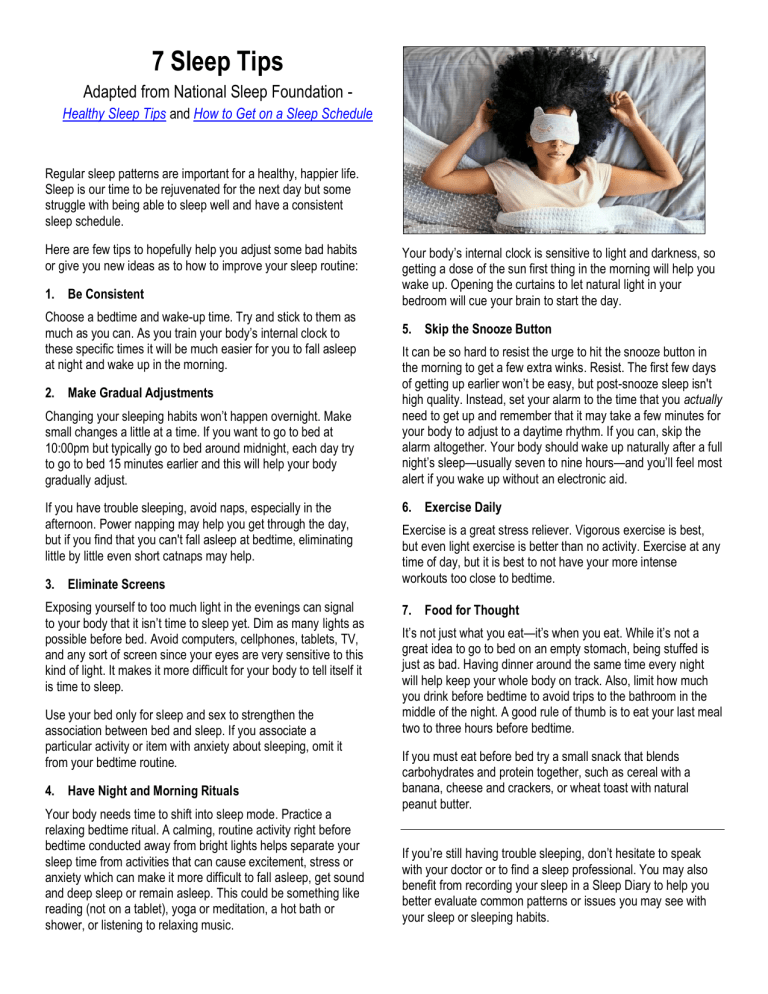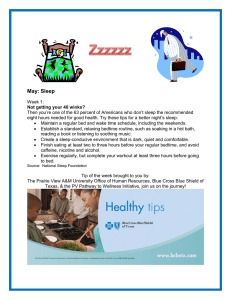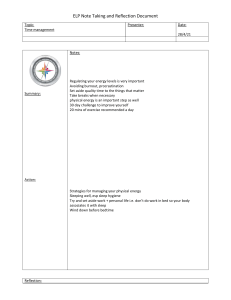
7 Sleep Tips Adapted from National Sleep Foundation Healthy Sleep Tips and How to Get on a Sleep Schedule Regular sleep patterns are important for a healthy, happier life. Sleep is our time to be rejuvenated for the next day but some struggle with being able to sleep well and have a consistent sleep schedule. Here are few tips to hopefully help you adjust some bad habits or give you new ideas as to how to improve your sleep routine: 1. Be Consistent Choose a bedtime and wake-up time. Try and stick to them as much as you can. As you train your body’s internal clock to these specific times it will be much easier for you to fall asleep at night and wake up in the morning. 2. Make Gradual Adjustments Changing your sleeping habits won’t happen overnight. Make small changes a little at a time. If you want to go to bed at 10:00pm but typically go to bed around midnight, each day try to go to bed 15 minutes earlier and this will help your body gradually adjust. If you have trouble sleeping, avoid naps, especially in the afternoon. Power napping may help you get through the day, but if you find that you can't fall asleep at bedtime, eliminating little by little even short catnaps may help. 3. Eliminate Screens Exposing yourself to too much light in the evenings can signal to your body that it isn’t time to sleep yet. Dim as many lights as possible before bed. Avoid computers, cellphones, tablets, TV, and any sort of screen since your eyes are very sensitive to this kind of light. It makes it more difficult for your body to tell itself it is time to sleep. Use your bed only for sleep and sex to strengthen the association between bed and sleep. If you associate a particular activity or item with anxiety about sleeping, omit it from your bedtime routine. 4. Have Night and Morning Rituals Your body needs time to shift into sleep mode. Practice a relaxing bedtime ritual. A calming, routine activity right before bedtime conducted away from bright lights helps separate your sleep time from activities that can cause excitement, stress or anxiety which can make it more difficult to fall asleep, get sound and deep sleep or remain asleep. This could be something like reading (not on a tablet), yoga or meditation, a hot bath or shower, or listening to relaxing music. Your body’s internal clock is sensitive to light and darkness, so getting a dose of the sun first thing in the morning will help you wake up. Opening the curtains to let natural light in your bedroom will cue your brain to start the day. 5. Skip the Snooze Button It can be so hard to resist the urge to hit the snooze button in the morning to get a few extra winks. Resist. The first few days of getting up earlier won’t be easy, but post-snooze sleep isn't high quality. Instead, set your alarm to the time that you actually need to get up and remember that it may take a few minutes for your body to adjust to a daytime rhythm. If you can, skip the alarm altogether. Your body should wake up naturally after a full night’s sleep—usually seven to nine hours—and you’ll feel most alert if you wake up without an electronic aid. 6. Exercise Daily Exercise is a great stress reliever. Vigorous exercise is best, but even light exercise is better than no activity. Exercise at any time of day, but it is best to not have your more intense workouts too close to bedtime. 7. Food for Thought It’s not just what you eat—it’s when you eat. While it’s not a great idea to go to bed on an empty stomach, being stuffed is just as bad. Having dinner around the same time every night will help keep your whole body on track. Also, limit how much you drink before bedtime to avoid trips to the bathroom in the middle of the night. A good rule of thumb is to eat your last meal two to three hours before bedtime. If you must eat before bed try a small snack that blends carbohydrates and protein together, such as cereal with a banana, cheese and crackers, or wheat toast with natural peanut butter. If you’re still having trouble sleeping, don’t hesitate to speak with your doctor or to find a sleep professional. You may also benefit from recording your sleep in a Sleep Diary to help you better evaluate common patterns or issues you may see with your sleep or sleeping habits.



